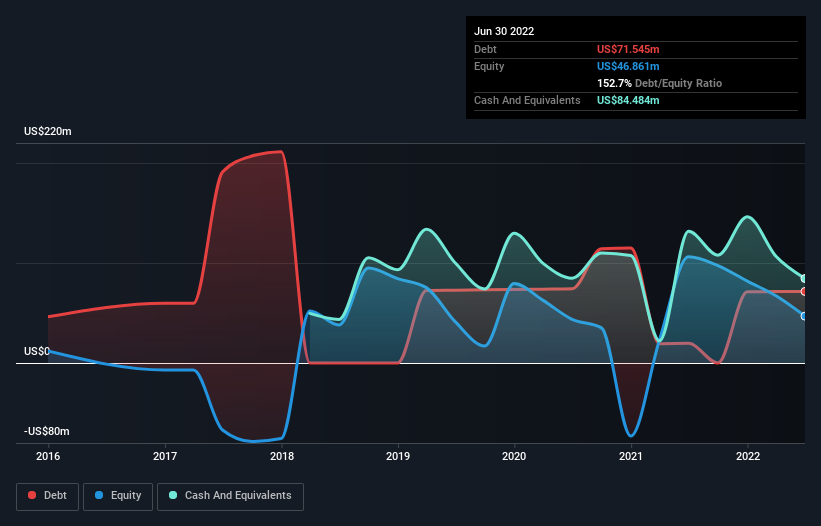Warren Buffett famously said, 'Volatility is far from synonymous with risk.' So it might be obvious that you need to consider debt, when you think about how risky any given stock is, because too much debt can sink a company. As with many other companies Evolus, Inc. (NASDAQ:EOLS) makes use of debt. But the more important question is: how much risk is that debt creating?
What Risk Does Debt Bring?
Debt is a tool to help businesses grow, but if a business is incapable of paying off its lenders, then it exists at their mercy. Part and parcel of capitalism is the process of 'creative destruction' where failed businesses are mercilessly liquidated by their bankers. However, a more common (but still painful) scenario is that it has to raise new equity capital at a low price, thus permanently diluting shareholders. By replacing dilution, though, debt can be an extremely good tool for businesses that need capital to invest in growth at high rates of return. The first step when considering a company's debt levels is to consider its cash and debt together.
Our analysis indicates that EOLS is potentially undervalued!
What Is Evolus's Debt?
As you can see below, at the end of June 2022, Evolus had US$71.5m of debt, up from US$19.6m a year ago. Click the image for more detail. But it also has US$84.5m in cash to offset that, meaning it has US$12.9m net cash.

How Strong Is Evolus' Balance Sheet?
According to the last reported balance sheet, Evolus had liabilities of US$51.5m due within 12 months, and liabilities of US$112.5m due beyond 12 months. Offsetting these obligations, it had cash of US$84.5m as well as receivables valued at US$26.9m due within 12 months. So it has liabilities totalling US$52.6m more than its cash and near-term receivables, combined.
Of course, Evolus has a market capitalization of US$425.8m, so these liabilities are probably manageable. Having said that, it's clear that we should continue to monitor its balance sheet, lest it change for the worse. While it does have liabilities worth noting, Evolus also has more cash than debt, so we're pretty confident it can manage its debt safely. When analysing debt levels, the balance sheet is the obvious place to start. But ultimately the future profitability of the business will decide if Evolus can strengthen its balance sheet over time. So if you're focused on the future you can check out this free report showing analyst profit forecasts.
In the last year Evolus wasn't profitable at an EBIT level, but managed to grow its revenue by 73%, to US$132m. With any luck the company will be able to grow its way to profitability.
So How Risky Is Evolus?
We have no doubt that loss making companies are, in general, riskier than profitable ones. And in the last year Evolus had an earnings before interest and tax (EBIT) loss, truth be told. And over the same period it saw negative free cash outflow of US$101m and booked a US$79m accounting loss. Given it only has net cash of US$12.9m, the company may need to raise more capital if it doesn't reach break-even soon. Evolus's revenue growth shone bright over the last year, so it may well be in a position to turn a profit in due course. By investing before those profits, shareholders take on more risk in the hope of bigger rewards. There's no doubt that we learn most about debt from the balance sheet. But ultimately, every company can contain risks that exist outside of the balance sheet. Case in point: We've spotted 1 warning sign for Evolus you should be aware of.
If, after all that, you're more interested in a fast growing company with a rock-solid balance sheet, then check out our list of net cash growth stocks without delay.
Valuation is complex, but we're here to simplify it.
Discover if Evolus might be undervalued or overvalued with our detailed analysis, featuring fair value estimates, potential risks, dividends, insider trades, and its financial condition.
Access Free AnalysisHave feedback on this article? Concerned about the content? Get in touch with us directly. Alternatively, email editorial-team (at) simplywallst.com.
This article by Simply Wall St is general in nature. We provide commentary based on historical data and analyst forecasts only using an unbiased methodology and our articles are not intended to be financial advice. It does not constitute a recommendation to buy or sell any stock, and does not take account of your objectives, or your financial situation. We aim to bring you long-term focused analysis driven by fundamental data. Note that our analysis may not factor in the latest price-sensitive company announcements or qualitative material. Simply Wall St has no position in any stocks mentioned.
About NasdaqGM:EOLS
Evolus
A performance beauty company, delivers products in the cash-pay aesthetic market in the United States, Canada, Europe, and Australia.
Very undervalued with exceptional growth potential.
Similar Companies
Market Insights
Community Narratives




